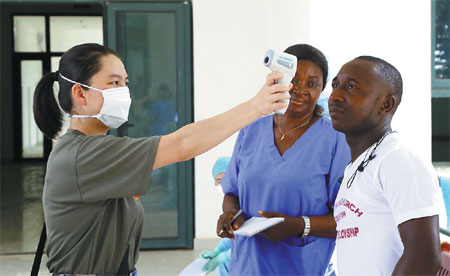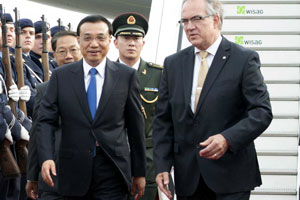China rushes help to Ebola-hit countries
By Joseph Catanzaro and Chen Yingqun (China Daily Africa) Updated: 2014-10-24 07:27
|
A Chinese medical worker demonstrates equipment to test body temperature at the China-Sierra Leone Friendship Hospital in Freetown. Huang Xianbin / Xinhua |
Deep inside the utilitarian-looking compound that is the Center for Disease Control and Prevention in Beijing, on a blustery March morning, He Xiong sat down at his computer to go through his daily ritual of checking the World Health Organization website for alerts.
"When I first saw that Ebola had broken out in several different African countries, my first reaction was to think this is not particularly terrible," He says. "But even then I thought it wasn't good, because it involved different countries, having crossed borders."
The deputy-director of the Beijing CDC, He is a front-line veteran of China's battle with SARS, the deadly virus first reported in Asia in February 2003. It killed 774 people worldwide and struck down about 8,000 with symptoms, says the US Centers for Disease Control and Prevention, before it was contained in 2003 thanks to a massive effort.
It was with this on his mind that He picked up the phone and started making calls.
"I started talking with colleagues and friends who work in the same field as me," he says. "They were concerned about the outbreak, too."
Concern quickly turned into momentum. No one else in China's Ministry of Health had forgotten SARS, either. The specter of the 21st century's first big epidemic still loomed large.
Within days He was sitting in on high-level meetings called by the Ministry of Health.
"The discussion was about the Ebola virus," he says. "We were talking and also thinking about how we could help Africa with it."
Half a world away, where people were becoming infected and dying in Guinea and Sierra Leone, shortly before Liberia would be added to the list of countries where the deadly virus was appearing, He and his colleagues realized it was time for backroom talks to be turned into action.
China's leaders had come to the same conclusion. At the highest echelons of power in Beijing, Ebola had grabbed the attention of policymakers who recalled the struggle to stop the spread of SARS in their country.
With China strongly linked to West Africa by ties of trade and diplomacy and friendship, with the knowledge that borders are porous in a highly connected world and a viral threat to one is a viral threat to all, the course of action was clear.
"China and Africa have a very good relationship, and Africans have contributed a lot to China," He says. "We wanted to support and help as much as we could."
Chinese officials made it clear very early on that in this battle, Africans would not be left to fight alone.
"Beijing has been sending teams to Guinea to offer medical support for many years, as the medical system and resources there are poor," He says. "So we immediately got some information from our people on the ground.
"We knew that if the disease took hold in many places it would be difficult to control as the medical infrastructure in Africa is not that good. So as soon the world started to report on the disease, we began thinking about coping mechanisms."
- DPRK to bar foreign tourists to prevent Ebola virus
- WHO calls for screening measures against Ebola spread
- New York doctor tests positive for Ebola
- NYC hospital testing doctor for Ebola virus
- UN calls on Chinese businesses to help fight Ebola
- China rushes help to Ebola-hit countries
- US to track everyone from Ebola nations











